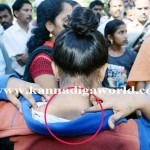Representational Image
Washington: The use of ultrasound in detecting breast cancer has been shown to be comparable in its sensitivity to that of mammography and should be considered when testing for the deadly disease, according to a new study. The number of breast cancers is increasing across the globe, with over 1.6 million new cases of the disease in 2010, resulting in the deaths of over 425,000 women, researchers said.
Additionally, 2.1 million new breast cancer cases are expected by 2030, according to Wendie A Berg from Magee-Womens Hospital at University of Pittsburgh Medical Centre (UPMC) in US. While mammography is an effective method in detecting breast cancer in developed countries, it is not commonly available in less developed nations, and alternative methods, such as ultrasound, need to be tested. To determine the effectiveness of using ultrasound to detect breast cancer, researchers recruited 2,809 women across 20 different sites in the US, Canada and Argentina to the breast cancer screening study.
Of the participants, 2,662 completed three annual breast screenings by ultrasound and film-screen or digital mammography, and then had a biopsy or a 12-month follow-up.
The researchers found that the number of ultrasound screens to detect breast cancer was comparable to that of mammography. They also found that there was a greater proportion of invasive and node-negative cancers in those who had ultrasound; however, there was also a greater number of false-positives among the women screened with ultrasound.
While the false-positive rate of ultrasound exceeds that of mammography, the number of women recalled for extra testing becomes more comparable on incidence screening rounds, researchers said. “Where mammography is available, ultrasound should be seen as a supplemental test for women with dense breasts who do not meet high-risk criteria for screening MRI and for high-risk women with dense breasts who are unable to tolerate MRI,” they said. The study was published in the Journal of the National Cancer Institute.



